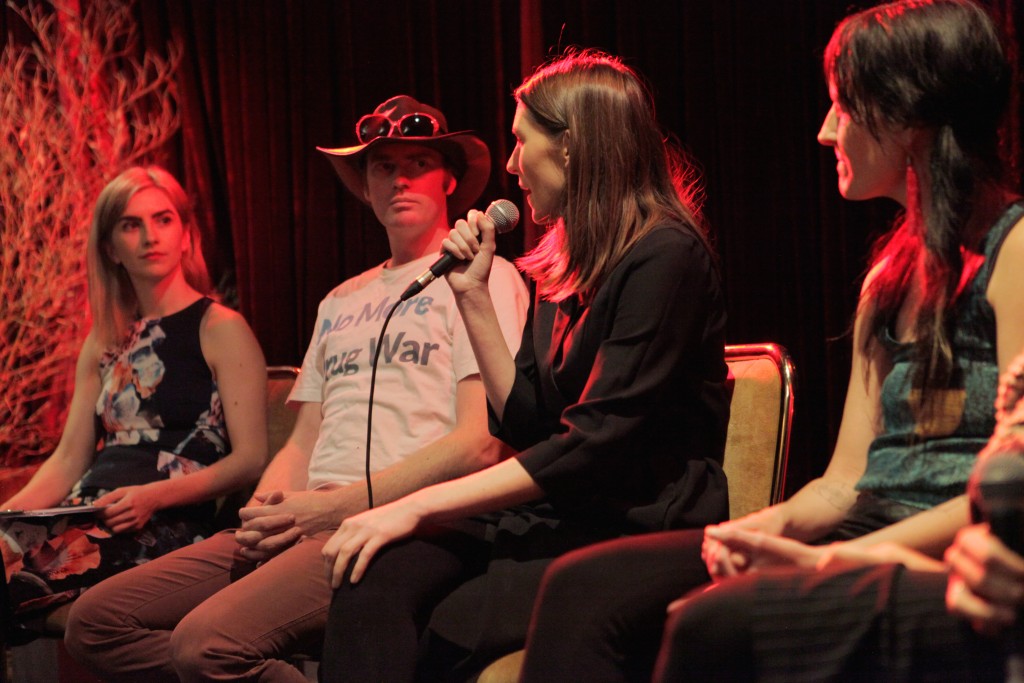Introducing High Alert: The Group Fighting Melbourne’s Controversial New Drug Crackdown
"We're passionate about keeping our nightlife vibrant and free from discrimination."

Recreational and party drug use in Melbourne, a longstanding bugbear for Victorian politicians, is again under fire from prowling cops in the form of Operation Safenight. The program, which will run through to August, sends extra police patrols and sniffer dogs out to the nightclub district on Chapel Street, with the power to stop and search patrons on the street, standing in lines, and in vehicles. Plain clothes officers will also be sent into the clubs to pose as buyers and patrol the bathrooms.
The program has copped a lot of criticism and now former politician and activist Nevena Spirovska has launched High Alert Melbourne: an awareness and support campaign that aims to combat Victoria Police’s party drug crackdown.
High Alert, which launched at popular Melbourne venue Hugs & Kisses last week, is a campaign that combines awareness, support and referrals for legal advice to ensure that those who enjoy the nightlife in Melbourne know what their rights are if they are approached by police with dogs. Of course, not everyone is thrilled with the campaign, but it’s already got a groundswell of popular support from young people. This isn’t the first time people have raised concerns over new recreational drug crackdowns and deterrent-based programs from police.
Spirovska, a former Sex Party candidate and a drug reform law activist, is bright and energised when she comes to the phone. It’s the day of High Alert’s launch and she tells me she’s ready to talk to me so she can help Junkee readers “keep out of trouble”.

What Is High Alert, Anyway?
Drug law reform surrounding recreational drug use might not seem particularly important to some, but Spirovska is very serious about it. Despite her light demeanour, when we begin our discussion about High Alert and harm reduction, she snaps into business mode. “I’ve worked in drug law reform for six years,” she tells me. “It’s something I’m particularly passionate about because I feel it’s just so misrepresented.”
Spirovska, who was the Treasurer and the State and Federal Election Campaign Manager for the Australian Sex Party from 2014-17, is not only the founder of High Alert Melbourne, she’s also its face. High Alert, she tells me, is an “independent, grassroots and harm reduction-focused campaign”, which will alert the public to police presence on Chapel Street, as well as their rights when dealing with law enforcement, via their Facebook page, flyers handed out on Chapel Street, and a High Alert Hotline. Spriovska tells me this is the most “salacious” part of the campaign; the hotline will inform the public where the police are conducting searches, in real time, so the public can “use the information as they like”.
High Alert was walking Chapel Street with flyers and information on Saturday, April 22, when the police arrived with a pack of sniffer dogs and arrested a whopping 20 people on drug-related charges. I ask Spirovska what she thinks of Operation Safenight, and she doesn’t hold back. “I think it’s an ineffective use of police time and resources,” she says, “and for that we’re going to hold the police accountable.”

Solicitor Sophie Stafford speaks at High Alert’s campaign launch.
Accountability is a huge part of High Alert Melbourne, and Spirovska’s agenda, as well as just practical harm reduction. “From a healthcare and humanitarian perspective,” she explains, “we’ve seen where people panic if they see dogs in the distance and take all of their drugs at once. This has led to a few really tragic and preventable deaths.”
Of course, there’s no telling who will use High Alert’s services for good and who will use it to find ways of contributing to that health crisis — dealers shilling dodgy product, for example. Spirovska isn’t naive about this possibility, but she maintains that “High Alert is empowering people with information about what the dogs do and don’t do, what this Operation is about, and what their rights are in those situations.”
Sydneysiders will be somewhat familiar with the scenes from these recent crackdowns. As Spirovska points out, “this has been happening at their train stations, and in and outside their bars. But this is new for Melbourne, and if we don’t take a stand and say, ‘we’re not comfortable with the police using all of these resources for policies that don’t work’. Then we see things like drug-testing people on welfare.
“When drugs are illegal and we’re trying to do harm reduction, there’s no policy that governments won’t go to to make a point.”
Australia’s History With Drug Law Reform
Spirovska is the first to acknowledge that Australia has a “complicated relationship” when it comes to drugs and alcohol, but she believes this is largely an issue of unfair stigma, “through decades of misinformation and campaigns that don’t work”. When we discuss Australia’s hard-line approach to recreational drug use, she points out, “Alcohol and tobacco, the two most deadly substances, are the two most legal and commonly used. They don’t have the same kind of scrutiny.”
It’s true that drug reform around recreational drugs like cannabis and LSD is a process that moves at a glacial pace in Australia. Despite dozens of campaigns and recommendations to introduce pill testing as a harm reduction and awareness measure at music festivals, the government and law enforcement in most states remains unmoved.
“Pill testing has been incredibly effective when it’s been set up in Europe, in countries like the Netherlands,” Spirovska says. “More often than not it shows when people are empowered with information that says: ‘Hey, what you’re taking isn’t what you think it is’, they just simply throw it in the bin because $30 isn’t worth your life.” She tells me she thinks the negative attitude toward pill-testing in Australia is “tragic”. “Instead of taking this hard-line approach,” she suggests, “we can give [drug users] information.”
Spirovska is extremely sceptical about the use of sniffer dogs on the streets in nightclub areas, which she says is “an ineffective way to reduce drugs associated with harm”. “We’ve found in our research that sniffer dogs don’t stop the use of drugs, they just change the way people use them,” she says. Spirovska says this can lead to the kind of risky drug-use behaviour that causes the most harm, things like “pre-loading” (taking all your drugs at once so you won’t get caught), or avoiding security personnel at clubs and festivals, even when you’re ill and need help.
There’s also some ambivalence about the effectiveness of sniffer dogs in these environments. Spirovska tells me that, according to her research, “the dogs get it wrong a lot of the time”. The figure Spirovska quotes for false detection when dogs are used in the street is 60 to 80 percent. Indeed, a 2006 ombudsman’s report into the accuracy of drug detection dogs states that, during their review, “No drugs were located in almost three-quarters of searches following indications”, although NSW Police have claimed that dog indications are accurate around 70 percent of the time.
Spriovska also calls the crackdown “an invasion of our civil liberties, right to privacy and right to move around freely”. Here is where she comes up against a lot of criticism from unsympathetic members of the public. Spirovska was hit with a wave of pushback against High Alert during a heated interview with Tom Elliot on 3AW earlier this month. One listener called in to suggest that Spirovska must be “a dealer herself” because of her dedication to the cause, and another individual nonsensically likened the campaign to “the legalisation of the bashing of old people”.
However, Spirovska doesn’t seem too worried. She tells me that the response has been “very positive … from people who understand the nightlife”. She has certainly received a great deal of support from events like Cool Room in Melbourne. Many musicians and club owners have spoken out against the Operation, which they say is ineffective and an infringement of people’s rights. Kate Pern, one of the voices of Cool Room, released a statement on Medium in support of High Alert, explaining “At Cool Room, we support harm reduction… We believe the government has a responsibility to write drug policy that is based on evidence, that protects the community from harm, and that promotes health and safety.”
“Be alert, and a little bit alarmed.”
The debate around drug policy and deterrence versus harm reduction is far from over. Drug law is a complex issue that no one yet knows how to solve, and precedent proves that the government will often resort to a fire-and-brimstone approach in their perceived ‘war on drugs’. But Spirovska is right when she says it’s our responsibility (and our right) to hold law enforcement and the government accountable for policies like Operation Safenight, which employ our tax dollars to target drug use in a potentially ineffective manner.
As Operation Safenight continues each weekend, in its bid to “improve safety and crack down on drug and alcohol misuse and anti-social behaviour”, High Alert will continue to patrol the streets, armed with information and support, to offset the potential risk of this crackdown operation.
Now the campaign has officially launched, Spirovska is keen to ensure that every Melbourne club-goer is informed about what their rights are. “I want [people] to know that it’s happening, and it could happen to them,” Spriovska says. “So just be wise, if you’re a person who uses drugs and goes out in the Chapel Street precinct. Look out for yourselves, and for your friends. Be alert, and a little bit alarmed.”
–
You can find more information about the High Alert campaign on their website.
–
Matilda Dixon-Smith is Junkee’s Staff Writer. She tweets at @mdixonsmith.





